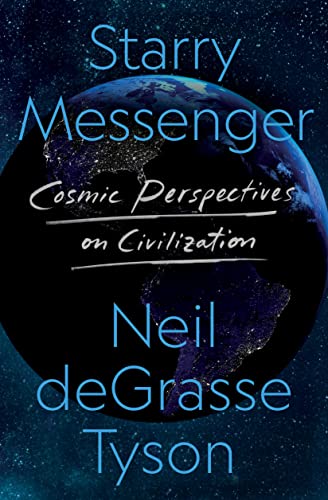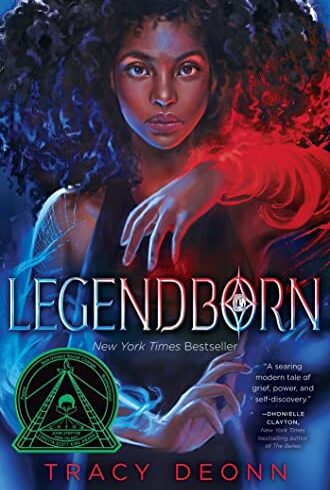Description
NEW YORK TIMES BESTSELLER Bringing his cosmic perspective to civilization on Earth, Neil deGrasse Tyson shines new light on the crucial fault lines of our time―war, politics, religion, truth, beauty, gender, and race―in a way that stimulates a deeper sense of unity for us all. In a time when our political and cultural views feel more polarized than ever, Tyson provides a much-needed antidote to so much of what divides us, while making a passionate case for the twin chariots of enlightenment―a cosmic perspective and the rationality of science. After thinking deeply about how science sees the world and about Earth as a planet, the human brain has the capacity to reset and recalibrates life’s priorities, shaping the actions we might take in response. No outlook on culture, society, or civilization remains untouched. With crystalline prose, Starry Messenger walks us through the scientific palette that sees and paints the world differently. From insights on resolving global conflict to reminders of how precious it is to be alive, Tyson reveals, with warmth and eloquence, an array of brilliant and beautiful truths that apply to us all, informed and enlightened by knowledge of our place in the universe.














Brannon –
The pettiness of our qualms – our political, social, and personal qualms – are both dwarfed and made more apparent by the natural grandiosity of the universe at large. Tyson has made a career and codified a philosophy of this message. There is something about the sweeping indifference of it all, the ego-shattering disinterest of the cosmic perspective that is at once both frightful and also unbelievably freeing. As many other great scientists have noted, the fact that the universe is knowable at all, and that we are around and capable to know it, is beautiful. Tyson notes, “No message written on tablets in the sky pre-required this to be so. It just is. For me, this summit of objective truth makes the universe itself the most beautiful thing in the universe.” Given this, Tyson does something with this latest effort that he has traditionally avoided in the past, which is to speak on pressing social or cultural issues that beset the present moment. Other generalized topics are addressed as well, but the great astrophysicist and science expositor attempts to imbue our terrestrial and human problems with a cosmic perspective – looking at these issues with a broader, grander view of our reality. Although not always successful in this endeavor (even the smartest of us can miss the forest for the trees), Tyson does generally impart a healthy, fresh perspective to these areas of interest, perhaps a puzzling project given his prior avoidance of jumping into the fray – but one that is still decidedly characteristic of his deeper interest in the universe. And so, in a way, we get Tyson’s Greatest Hits., It is probably a fitting place to start that he begins the book by discussing truth and beauty and how, namely, cold indifferent truths can themselves be beautiful. This may contrast with our traditional view of beauty, which lies squarely in the subjective realm. But Tyson’s view here does not contradict that traditional sentiment; it merely adds another dimension, a broader view. “Objective truths apply to all people, places, and things, as well as all animals, vegetables, and minerals. Some of these truths apply across all of space and time. They are true even when you don’t believe in them.” The universality of objective truth, then, makes it attractive. The point, though, is that the attractiveness of truth is neither here nor there. And, ironically, this makes truth beautiful in a cosmic way. He goes on to sinch the point: “Objective truths of science are not founded in belief systems. They are not established by the authority of leaders or the power of persuasion. Nor are they learned from repetition or gleaned from magical thinking. To deny objective truths is to be scientifically illiterate, not to be ideologically principled.” In other words, ignoring basic facts does not make one strong-willed in any morally or practically useful way. The question may arise – as it did on Lawrence Krauss’s podcast, Origins, with the two in conversation – about science changing or modifying our ideas of truth. To this Tyson answers (perhaps unsatisfactorily) that objective truth should not be confused with absolute truth, adding for good measure that Newtonian principles will never be upended., One more important piece to note about his chapter on truth and beauty is that while “personal truths” can be healthy in navigating the human condition, we should be careful not to conflate them with objective truths. “Social, political, or legislative attempts to require that everybody agree with your personal truths are ultimately dictatorships.” He rightly fears our devaluing objective science in lieu of subjective zealotry., Tyson goes on to offer general insights in chapters like “Exploration & Discovery” and “Earth & Moon.” Particularly, there is one moving passage that bookends his adumbration of global political strife and poverty, instead taking a cosmic overview of these problems. “I can know all this intellectually for having read about it, but when I confront it from above, with details stripped away, I don’t see the politics, the history, the skin colors, the languages, the bigotry, the racism, the protests. I’m instead plagued by a simpler thought that, as a species, we might not possess the maturity or wisdom the future requires to assure the survival of civilization.” When framed in such stark terms, it should give us all pause for contemplation. We are, in the end, a species vying for survival, and perhaps fighting only against ourselves on a planet possessed of its own survival., Veering into social and cultural territory, Tyson finds less success in making a solid case for the “cosmic perspective.” His ultimate goal here, admirably, is to show that when it comes to gender, race, and identity, we are all more alike than different. This is, perhaps, the sort of ecumenical view the world needs. Unfortunately, though, he seems intent on ignoring some objective truths that he so strongly defends earlier in the book. While gender is fluid and exists on a continuum, sex is not. We know certain objective differences to be true generally of men and women, and not just phenotypically but also in reference to potentialities and even interests and dispositions. Tyson does not exactly reject this, but elides much of it for his personal view of this issue. He even peddles in blatant contradictions when it comes to the chapter on race. Although he rightly – but unoriginally – bemoans the history of black and brown disenfranchisement, he goes on to offer a full-fisted irony when it comes to the weird issue of removing “offensive” statues. Tyson seemingly offers a robust and fair historical defense of Teddy Roosevelt and a particular statue of him, but then strangely notes that he is glad it was taken down. What follows his full account of this history – his broad or “cosmic” vantage point – is this odd and fully contradictory statement: “Remembering too that our opinions take shape on an ever-shifting landscape of social and cultural mores. A full perspective on the statue leaves me happy to see it removed, only because nobody would conceive of such a statue today, which is the litmus test for any indictment I seek.” This sentiment is an abomination to historians and those who wish to preserve the full richness of the past, with full regard to past moral atrocities (and perhaps especially to that which may be morally ambiguous). He then goes on. “My urge is to gesture a forgiving nod to the past while I display a furrowed brow to the future, wondering how today’s most progressive creations may appear to our ever-more-enlightened descendants a hundred years from now.” The reader may be hard-pressed to believe the same author penned these two distinct ideas mere sentences apart. Even physicists can get it wrong (perhaps especially when it deals with matters outside their wheelhouse, namely of hard, objective facts)., Much of this book, however, is uplifting. In his coda on life and death, Tyson offers some beautiful thoughts. When contemplating the very essence of life and death, he says, “…but maybe the knowledge of death creates the focus that we bring to being alive. […] There is perhaps no greater de-motivating force than the knowledge you will live forever.” As others have said, life is only special because it ends. As natural as it is to cling to religious notions of an eternal afterlife, it becomes an ugly wish upon fuller investigation. “It is better to be alive than dead. Though more often than not, we take being alive for granted.” This is why it is important to see a grander or cosmic view of our reality. Inspired, he continues. “Being alive is the time to celebrate being alive – every waking moment.”, With this in view, Tyson closes his book and his most recent effort to impart the majesty of life and, quite literally, the universal view of taking part in it. He compels the reader to ask himself if he has made any positive contribution to humanity while alive. “On the whole, I don’t fear death. Instead, I fear a life where I could have accomplished more.” We can all do better. We can all offer more hope to humanity. We can all live a more fulfilled life where “curiosity and wonder, the twin chariots of cosmic discovery, will ensure that starry messages continue to arrive.”, Objective truth is essential, but so is the depth and heaviness of our hearts. And we only get one life. He closes with this hauntingly breathtaking observation: “We get to invoke our faculties of reason to figure out how the world works. But we also get to the smell the flowers. We get to bask in divine sunsets and sunrises, and gaze deeply into the night skies they cradle. We get to live, and ultimately die, in this glorious universe.”, Curiosity and wonder are always profound places to start.
Harold DeRienzo –
Starry Messenger, Cosmic Perspective on Civilization by Neil deGrasse Tyson (Henry Holt and Company, 2022), An interesting book that seems to have two overriding themes: first, appreciate and even consider acting more like a scientist. We are encouraged to be more open-minded and guided by “facts” only after actionable belief is subjected to exposure, testing and peer review. Secondly, it would help for us to think in other than binary terms, even though it is in our nature to do so. Much of what we view as either one thing or another can be deceptive. Our inclination to think in binary terms blinds us to the reality that much of the life we live and encounter exists as part of a vast spectrum, with innumerable and nuanced aspects., Some of the book smacks of mild conceit, such as when he relates how it took him 73 seconds to solve a Rubik’s cube. I say this because he was comparing his performance to that of a super-computer. Regardless, his stories are worthwhile. My favorite story concerns one of the three times he was excluded from serving on a jury. It was a criminal trial, and he made the penultimate cut for selection to the jury. The judge asked if any of the remaining potential jurors had any questions. Tyson raised his hand and asked why the judge told them that the defendant is charged with possession of 1700 milligrams of coke, instead of saying that he is charged with 1.7 grams, which is a more accurate description (since the thousand in 1700 and “mil” in milligrams cancel one another out). Of course, he was implicitly saying that the former characterization suggests a very large quantity to the uninformed juror, which would likely produce bias. Not surprisingly, he was excused once again from serving as a jury member., He does an excellent job in his treatment of disabilities, citing examples of people who have excelled in spite of what are commonly viewed as disabilities. He queries if Stephen Hawking was really disabled, given his proficiency in science and whether, when compared to his intellect and accomplishments, is it we or most of us who should be considered disabled? He cites to Helen Keller, Jim Abbott (the Yankee pitcher with only one hand who pitched a no-hitter against Cleveland), and others who excelled, regardless of what would generally be considered as having a debilitating trait. He takes this one step further and compares our capabilities to other living organisms on this planet. Within the animal kingdom, our natural capabilities are far from ideal when it comes to our somewhat deficient five senses. Yes, but what about our big brains? We do not even possess the largest brains in the animal world (whales, elephants and dolphins have bigger brains). And who is to say that ants are not conscious? He refers to the mycelium network under trees as the “Wood Wide Web.” What makes our inter-communication more important than the obvious communications that go on underground?, With regard to race and gender identity, he effectively makes the case that there is a vast spectrum that must be considered relevant and acted upon in order to fully appreciate the vast “continuum” of human nature. His Chapter Four, entitled Conflict & Resolution, is a worthwhile read as well. He does a deep dive into what he refers to as standard Democratic and Republican tropes regarding one or the other party. He calls out unfair generalizations on both sides. Groups like Braver Angels make it their mission to promote conversations along these lines. Two examples:, Example 1: “Conservatives value the nuclear family and the stability it brings to civilization, unlike liberals, who live under questionable moral codes.”, Retort: “Nearly half of all babies born in the states of Louisiana, Alabama, Mississippi, Texas, Oklahoma, Arkansas, Tennessee, Kentucky, West Virginia and South Carolina are born to unmarried women…The corresponding rates for the famously blue states…are half that.”, Example 2: “Liberals occupy the high ground on science while conservatives embrace science deniers,”, Retort: “Other than climate change and modern biology, there’s very little else about science in America that conservatives deny…Okay. Then what about the liberals themselves? Turns out the following list of beliefs and practices lands squarely in their corral: crystal healing, therapeutic touch, feather energy, magnetic therapy, homeopathy, astrology, anti-GMO, anti-pharma.”, Finishing up with what an alien reaction to our existence might be, he reminds us that we, as humans, share 98% of our DNA make-up with chimps. He goes on to explain that the 2% does make, and has made, an enormous difference in our evolutionary progress, social relations, inventions and built environment. But then he goes on to speculate. What if aliens visiting earth were to have a genetic structure enhanced beyond our own, with a similar difference of 2%? In that event, we would be viewed, with all of our achievements, as little more than children or worse, inferior animals to be exploited for the benefit of the aliens., All of these musings and stories are intended to help us think about life and living in a more objective, reasoned way. As an attorney who was trained to think like an attorney, it was refreshing to be able to appreciate thinking in the way that Tyson suggests. His approach could be of great cultural benefit to us all. At the very least, he is recommending that we work to set aside our insecurities and open up to seeing the world the way he and (according to him) other scientists do. In the process, this could help us open up to one another by questioning our own biases that impede humanistic progress., Of course, this is easier said than done. I am reminded of a quote from John Dewey (Human Nature and Conduct): “Character that is unable to undergo successfully the strain of thought and effort required to bring about competing tendencies into a unity, builds up barriers between different systems of likes and dislikes. The emotional stress incident to conflict is avoided not by readjustment but by effort at confinement.” This quote resonates with the political divisions and confined tribalism we currently experience in this country. If the reader is looking for a guide as to how to motivate people to emerge from their caves (an analogy he makes in the beginning of the book in support of space travel) and undertake that “strain of thought and effort” required for human progress, it will not be found in this book. Perhaps the best we can do is bring scientists to a greater extent, with their perspectives and methods, into our political processes so, at the very least, implicit biases would be challenged before being acted upon. Regardless, I recommend the book. Beyond being informative, it is also an enjoyable read.